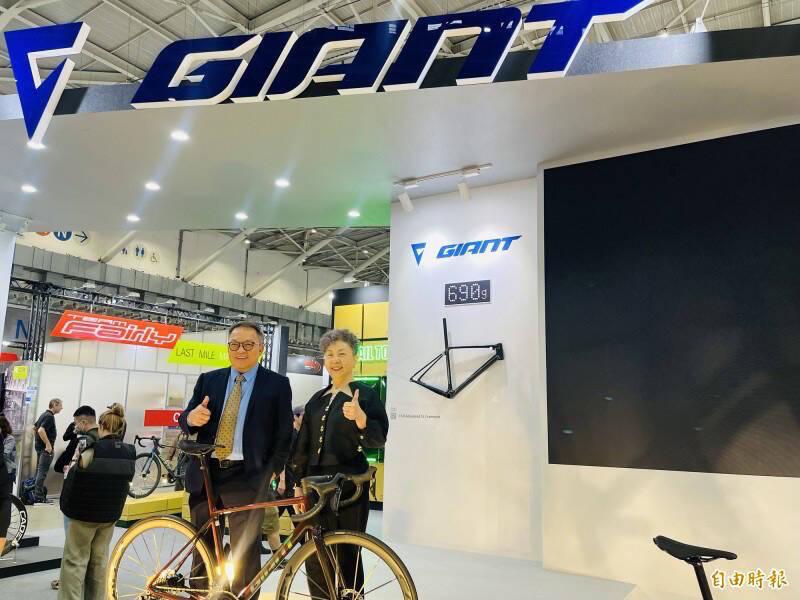US Customs and Border Protection (CBP) yesterday issued an order barring bicycles, bicycle parts and accessories made by Giant Group (巨大集團) in Taiwan over evidence of forced labor.
CBP said it had issued a withhold release order to detain shipments of bicycles made in Taiwan by Giant — the world's largest bicycle manufacturer — under a law prohibiting goods made using forced labor from entering the US.
The order does not appear to apply to Giant bicycles made outside of Taiwan. The company also has manufacturing facilities in China, Hungary, the Netherlands and Vietnam.

Photo: Taipei Times file
An investigation of Giant had identified forced labor indicators, including abuse of vulnerability, abusive working and living conditions, debt bondage, withholding of wages and excessive overtime, CBP said.
"Giant profited by imposing such abuse, resulting in goods produced below market value and undercutting American businesses by millions of dollars in unjustly earned profits," the CBP said in a statement announcing the order.
It did not provide details of the CBP investigation.
However, a report by the US Department of Labor based on interviews last year with Vietnamese and Thai migrant workers at Giant's factory in Taichung's Dajia District (大甲) identified multiple forced labor risks.
These included debt bondage risks due to home-country recruitment fees and deposits, monthly service fees to Taiwanese labor brokers, withheld wages, abusive living conditions, and intimidation and threats, the report said.
The company had taken steps to remedy some of the issues, such as by stopping wages from being withheld, renovating its workers' dormitories and planning to implement a zero fee policy from January, it said.
Although Giant was "communicative and partially committing" regarding the concerns, it "reject[ed] fee reimbursements," meaning that the debt bondage risk was "still real," the report said.
The Ministry of Economic Affairs yesterday said in a statement that it pledged to work with the Ministry of Labor to "quickly resolve any possible forced labor concerns" to get the ban lifted.
"As a responsible member of global supply chains, Taiwan has long attached great importance to improving labor conditions, and would continue to work with the Ministry of Labor to create a worker-friendly environment," it said.
Giant today said that it was "actively clarifying the facts" and would work to get the ban lifted.
In January, Giant implemented a "zero recruitment fee policy," under which it paid the recruitment, brokerage and government-related fees for all newly hired foreign workers, the company said.
It also completed renovations of its workers' dormitories late last year, providing "safer and more comfortable" living conditions, and introduced an internal control system to ensure its operations meet international labor standards, Giant said.

TECH TITAN: Pandemic-era demand for semiconductors turbocharged the nation’s GDP per capita to surpass South Korea’s, but it still remains half that of Singapore Taiwan is set to surpass South Korea this year in terms of wealth for the first time in more than two decades, marking a shift in Asia’s economic ranks made possible by the ascent of Taiwan Semiconductor Manufacturing Co (TSMC, 台積電). According to the latest forecasts released on Thursday by the central bank, Taiwan’s GDP is expected to expand 4.55 percent this year, a further upward revision from the 4.45 percent estimate made by the statistics bureau last month. The growth trajectory puts Taiwan on track to exceed South Korea’s GDP per capita — a key measure of living standards — a

Samsung Electronics Co shares jumped 4.47 percent yesterday after reports it has won approval from Nvidia Corp for the use of advanced high-bandwidth memory (HBM) chips, which marks a breakthrough for the South Korean technology leader. The stock closed at 83,500 won in Seoul, the highest since July 31 last year. Yesterday’s gain comes after local media, including the Korea Economic Daily, reported that Samsung’s 12-layer HBM3E product recently passed Nvidia’s qualification tests. That clears the components for use in the artificial intelligence (AI) accelerators essential to the training of AI models from ChatGPT to DeepSeek (深度求索), and finally allows Samsung

Taiwan has imposed restrictions on the export of chips to South Africa over national security concerns, taking the unusual step of using its dominance of chip markets to pressure a country that is closely allied with China. Taiwan requires preapproval for the bulk of chips sold to the African nation, the International Trade Administration said in a statement. The decision emerged after Pretoria tried to downgrade Taipei’s representative office and force its move to Johannesburg from Pretoria, the Ministry of Foreign Affairs has said. The move reflects Taiwan’s economic clout and a growing frustration with getting sidelined by Beijing in the diplomatic community. Taiwan

READY TO HELP: Should TSMC require assistance, the government would fully cooperate in helping to speed up the establishment of the Chiayi plant, an official said Taiwan Semiconductor Manufacturing Co (TSMC, 台積電) yesterday said its investment plans in Taiwan are “unchanged” amid speculation that the chipmaker might have suspended construction work on its second chip packaging plant in Chiayi County and plans to move equipment arranged for the plant to the US. The Chinese-language Economic Daily News reported earlier yesterday that TSMC had halted the construction of the chip packaging plant, which was scheduled to be completed next year and begin mass production in 2028. TSMC did not directly address whether construction of the plant had halted, but said its investment plans in Taiwan remain “unchanged.” The chipmaker started